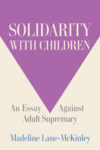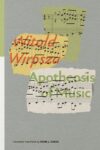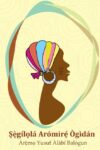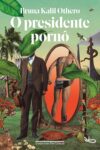 Elle Nash’s fiction is brutal. In her novel Animals Eat Each Other (Dzanc, 2018), and her short fiction on display in the recent chapbook Elizabeth and Mary and Elle (Witch Craft 2019) co-authored by Elizabeth Ellen and Mary Miller, she is able to mix visceral transgression with human tenderness to cut deeper into the reader than violence or love ever could on their own. The reality might be that violence and love do not exist separate, and the reality of her characters is palpable and familiar, though we might not want to think so. We chatted about those characters and their political realities, as well as Elle’s work as an editor for Hobart Pulp and Witch Craft.
Elle Nash’s fiction is brutal. In her novel Animals Eat Each Other (Dzanc, 2018), and her short fiction on display in the recent chapbook Elizabeth and Mary and Elle (Witch Craft 2019) co-authored by Elizabeth Ellen and Mary Miller, she is able to mix visceral transgression with human tenderness to cut deeper into the reader than violence or love ever could on their own. The reality might be that violence and love do not exist separate, and the reality of her characters is palpable and familiar, though we might not want to think so. We chatted about those characters and their political realities, as well as Elle’s work as an editor for Hobart Pulp and Witch Craft.
Kyle Williams: There is real violence and abuse throughout Animals Eat Each Other, but not, I felt, a lot of judgment. The characters are not grotesques in the way we might be used to reading about violent and abusive characters, but are crafted with a really incredible amount of care. How were you thinking about portraying characters with a balance of transgression and tenderness?
Elle Nash: My goal with fiction when I portray any character is to work as objectively as possible. Obviously, true objectivity is not attainable, but I think (most) people have facets to them that are both good and bad – people struggle with their personal development, with their morals, with being likable or wanting to be liked. I don’t think characters have to be likable or relatable to be portrayed, I just think it’s important not to editorialize the existence of others. Even when writing first person, it’s important to let the other characters come out through their actions, their dialogue, let the style of language the narrator uses speak to how they think of the characters around them, rather than them telling the reader how to feel or what to think about a person. Suffering is a human condition. Everyone suffers somehow. It’s important to show that, I think.
Economic stuckness plays a big role in the novel. What about that sort of political dynamic do you find compelling?
Economic stagnation is the generational reality of the United States. I had originally thought it was a reality of American people post-recession, like for Millennials and Gen Z, but the truth is economic mobility has always been restricted in this country, especially for marginalized classes. It is important to me to explore working class identities, partly from experiencing it but also because it seems like every major, best-selling, or super-hyped book that comes out features a narrator or main character that somehow lives in a position free of economic anxiety. They are always independently wealthy or their parents subsidize their rent while they work at art galleries in one of the most expensive cities in the country and then decide to quit and do drugs for an entire year, or they go to school without having to worry about tuition, etc. It’s like a shortcut: the character doesn’t have to make money so the writer can focus on “the real story,” and I get it. People love those books because they can live in the fantasy of a life free of work. I love reading those books because I want to be free of the reality of work, too. But it’s important to me to portray how the reality of work affects people, how generational poverty affects people. It’s important to me to show how easy it is for a person to lose everything in this country because of our lack of social safety programs.
The way you write about certain subcultures, like Satanism or tattooing, is really interesting. It doesn’t feel exploitative or journalistic, like subculture often does in fiction. What was your interest in writing about subculture?
I definitely wrote about it simply because I was interested in it! I’d never seen Satanism, or even a person getting a tattoo, portrayed in literature before, so I just wanted to write about it. I also wanted to capture that feeling of the early aughts when people were still really cliquey about music. Without Spotify and the internet being as open as it was, in high school people seemed to organize their social groups partly on class and also partly based on music. It doesn’t seem to be that way anymore with how open the internet is, but maybe I am wrong.
The way you write about sex and sexuality is also really interesting. It’s not just one thing, there’s sensuality and violence but also boredom and anxiety. How do you think about sex as a craft element?
I feel like, growing up, sex was always portrayed as a single, rigid thing: that you were supposed to like it, it was supposed to be a certain way (like between a man and a woman, for example), it was supposed to be something only people in love did, etc. But I think because it is such a common and almost-universal experience for people (even how one sexually experiences themselves) sex can be many things, it can be as unique and compelling as each person because it is also so personal. It can be boring, it can be anxiety-ridden, it can be awful and filled with dread. But it can also be ecstatic, exciting, fluid, it can be with many people at once or none at all, it can be sober or not sober, it can be sloppy or extremely clean. It’s just another way of connecting with a person.
I like the way you talk collaboration and community in writing. Was your novel a product of a writing community?
Thank you. To a degree, yes it was. The novel started as a short story in an online writing workshop run by Rae Gouriand. Then when I took it to Tom asking for help, he encouraged me to expand on it until I realized it was a novel and not just a short story. I don’t think I planned to have Animals as my first novel. It just kind of happened. But it happened because of the encouragement and feedback of the people around me – the friends who took the time to read and give feedback on it before it became a book, even writers I’d read while completing it, it all played a role somehow simply because of how their words changed me as a person and how that played into the final draft of the book. I’ve always felt that art is never a solitary act.
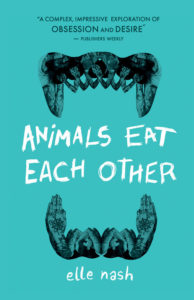
I was really taken by the Colorado Springs of Animals Eat Each Other. There is wonderful imagery associated with the nature there, and this intense darkness. I don’t think it is literal in the book, but it felt like it was always night. How were you thinking about using that setting?
Colorado has a rich tradition of writing the Rocky Mountains and that area as very flowery and poetic. Colorado Springs is a unique place – it has five military bases and a very stratified population, meaning the gap between the rich and poor is very wide. There is also a large fundamentalist presence there. I think once I read there are over six hundred churches in the city alone. And you just hear from tourists about how beautiful it is all the time. But being from there, it’s a struggle. In the “less prioritized” areas of the Springs, the roads don’t get fixed, they turned the streetlights off once due to budgetary restraints which led to an increase in crime. The whole southern part of the Springs felt forgotten as the northern part sprawled with urban development. The town itself is a weird mélange of this, dark and light, rich and poor, people in transit and people who end up stuck there their whole lives – I wanted to showcase that.
Do you think about a potential responsibility to place when you’re writing about it? Not just to the people who actually live there, but the geography?
Sure! To a degree I think there is something to be said by at least visiting the place you want to write about just once. I remember a local newspaper once covered a book that had just been released, but then it detailed everything the author got wrong about the locality. And it’s not that there’s anything wrong with making it up – I love the idea of creating alternative realities placed over our real world – it’s just that there’s a chance people will notice and as the author you have to ask yourself if you’re fine with that.
I love that you interviewed Chuck Palahniuk recently, in part because I haven’t really been made to think about him for a while. I think you’ve spoken about being a fan of his writing before, and I feel like you two write in similar interests. What was your interest in him, and do you see him as an influence?
Yeah, I definitely see Palahniuk as an influence for me, specifically his early work. I can’t remember what year I found Fight Club, but I do distinctly remember reading both Invisible Monsters and Diary during my accidental gap year between high school and college. It was probably, mental-health wise, one of the worst years of my life. I had an eating disorder, dropped down to the lowest weight I’d ever been, kind of hit a breaking point with myself. I was self-injuring a lot and unable to connect with people at all, and went through a really devastating break-up. I remember, outside of work and school, so much of that year I just laid in bed thinking about death all the time and reading books, feeling really alone. There was so much in Invisible Monsters I remember identifying with, copying quotes down into my journal. It’s probably been a decade or more since I’ve read it though.
I appreciated that I could read about characters that were also fucked up and flawed and struggling with themselves. And Diary was even better. Palahniuk’s novels usually feature these working class characters who have to give up a lot of their dignity just for a little bit of power, and at a time in my life when I felt powerless against myself, reading about characters struggling this way was really compelling to me. It also inspired me to see art as a through-line out of my despair. That I could pursue writing and find that as a reason for living was something new to me back then. And honestly in my later years, whenever I feel really dark, writing is one of those pathways out for me. Not just the act of doing it, but it as a concept, as a goal, a meaningful purpose and project.
I have to say though, after Pygmy came out I kind of dropped off with Chuck’s work. Man, I hated that novel. Haha.
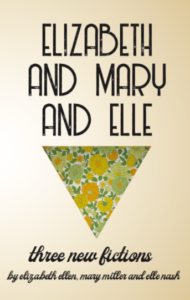
I’d love to talk a little bit about your work as an editor. How did you start Witch Craft?
In 2015 I met my former co-editor Catch Business at a reading in Denver, and we both started talking about how we wanted to create a reading series and help foster the lit community in the area. I’d wanted to start a zine for a while, but then we sort of decided it would be cool to do like, an actual literary journal, so we brainstormed and started Witch Craft. I was an editor on my high school newspaper and loved creating finished, paper products with the work of those I admired, so it was fun to dive back into doing page layout, book design, and all of that, too. It’s just been growing and morphing since then.
What do you see as the role of the editor, when you’re working on a piece?
This is a really good question and thinking about the role I take is actually hard to answer! I think one of my roles as an editor is to share voices that might not get heard anywhere else. It’s really important to me to provide that kind of platform – work that pushes boundaries, that is experimental or surprising, that details struggles you don’t generally read about in the bigger literary magazines. I also feel like, on a one-to-one basis, when I’m selecting a piece for publication and making edits or suggestions to it, I’m just trying to meet the piece where it’s at and make sure there aren’t any missed opportunities or minor mistakes that could dampen its potential. But I try to be really conscientious of the power dynamic between the editor and the writer. I’ve been on both sides, and sometimes receiving suggestions from an editor can feel terrifying – what if you disagree with what they think? As the writer I always feared disagreeing with a particular suggestion, fearing they might not want to publish the piece if I pushed back. So as an editor, I try to be really clear that ultimately my edits are only suggestions and not demands. If I select a piece to publish then I will publish the finished version of the piece the writer wants, since it is 100% their work.
Kyle Williams is a writer living in Brooklyn. He is an Interviews Editor for Full Stop, Director of Communications for Chicago Review of Books, and A Public Space’s 2019 Emerging Writer Fellow. He is on Twitter @kylecangogh.
This post may contain affiliate links.



